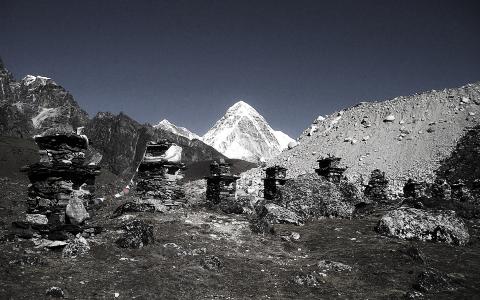
The Steadfastness in Yoga of a Jñānī
yuktaḥ karmaphalaṃ tyaktvā śāntimāpnoti naiṣṭhikīm
ayuktaḥ kāmakāreṇa phale sakto nibadhyate (BG 5.12)
The word “yukta” here means yoked or harnessed to yoga or being steadfast in yoga. A jñānī, having performed action, gives up its fruit. We realise quite soon that it is not easy to do so. But it is not that rare either. When can a planter of a coconut palm see its fruit? The planter of the tree is...

The phrase hita-nirata (engaged in welfare) does not involve merely uttering homilies. It means those who internally resolve to act towards universal welfare and ensure that those resolutions are acted upon externally. It is thus not necessary for a saṃnyāsin to give up activity that yields in the well-being of the world. But such activities have to be performed with an extraordinary mindset. The activity referred to here is interacting with the...

Prologue to Chapter 5
ಬೋಧಿಸಿದೆ ಕರ್ಮಯೋಗವ
ಬೋಧಿಸಿದಿದಯ್ ಸಂನ್ಯಸನವನುಮನಾ ದ್ವಿಕದೊಳ್ ।
ಸಾಧನ ಮೇಲೆನಗಾವುದೊ
ಆದೇಶಿಪುದೆಂದು ಬೇಡಿದಂ ಕೌಂತೇಯಂ ।। ೧
Bodhisidĕ karma-yogava
bodhisiday saṃnyasana-vanumanā dvikadadoḷ
sādhana melĕnagāvudŏ
ādeśipudĕṃdu beḍidaṃ kauṃteyaṃ ।। 1
The son of Kunti implored,
“You taught me the Yoga of action.
You taught me renunciation.
Which of the two paths is better for me?
Please instruct me”
ಕರ್ಮವನೆಸಗಿಯುಮಾತ್ಮದ
ನಿರ್ಮಲತೆಯ ಕಾವ...

APPENDIX 2
Distinction between karma and akarma
karmaṇo hy-api boddhavyam boddhavyam ca vikarmaṇaḥ
akarmaṇaś-ca boddhavyaṃ gahanā karmaṇo gatiḥ (BG 4.17)
The discussion on karma and akarma is so deep that it baffles even the wise, says Bhagavān. What does that imply? Simply that the responsibility of a man is great and that it should translate into sad-asad-viveka -- discernment between right and wrong, truth and falsehood. Thus it becomes...

When they ascend the throne, England’s Kings (or Queens) take an oath in front of their subjects that they will follow, preserve, and protect the traditional methods and rules of governance. In India, the President who is in place of the King, takes this oath while swearing in — “I will, to the best of my ability, preserve, protect and defend the Constitution and the law.” (Art. 60) Thus, even the highest official of the state is subject to the...

The Necessity of Firm Decision
Arjuna, if we analyse from the perspective of the supreme principle, it becomes clear that your doubts are baseless. Be firm about the ātmā. Do not entertain doubts in your mind.
ajñaścāśraddhadhānaśca saṃśayātmā vinaśyati
nāyaṃ loko’sti na paraṃ na sukhaṃ saṃśayātmanaḥ (BG 4.40)
(One who does not know, doesn’t have faith or is filled with doubts in his mind, perishes. A doubtful man can neither live in this...

A person who carries out his duties without considering it an offering, will not even gain the good in this world. Then, how can he obtain a good state in other worlds? Mokṣa is the best among the four cardinal aims of human life. Karma helps achieve dharma, artha and kāma (dharma, wealth, and enjoyment). Even so, karma is the necessary first step for mokṣa. Mokṣa is liberation from the burden of the universe. Since we do not know the true...

Once we say that it is not wrong but only fit and proper to experience pleasure, we have to make all arrangements to obtain it. Sustaining the family, earning a salary for their comfort, taking loans in case there are emergencies and repaying them, giving and taking help, struggling thus in many ways become the duty of a householder.
Śrī Śankarācārya’s instruction is thus –
yogarato vā bhogarato vā saṅgarato vā saṅgavihīnaḥ
yasya brahmaṇi...

Selfless Karma
Who should follow the principle of not wanting results for one’s duties? Those who are seeking mokṣa. How many of us are wishing for mokṣa? Surely, the number of people wishing for material things vastly exceeds that. We all desire something or the other. They may all be noble desires. For instance, those indulging in wrongdoing must be destroyed; we as a country should grow our own food; we have to establish ourselves well in the...

Arjuna is hasty. Initially, he was eager to fight. Then, he was eager to give up fighting. Vikarma is the result of this haste. Therefore, the following is said about those who deduce the nature of dharma -
yuktā āyuktāḥ
alūkṣā dharmakāmāḥ syuḥ
yathā te tatra varteran
tathā tatra vartethāḥ
Those who are skillful and experienced, not harsh, and practise dharma constantly, as they behave (during times of doubt), so too you shall.
—...
